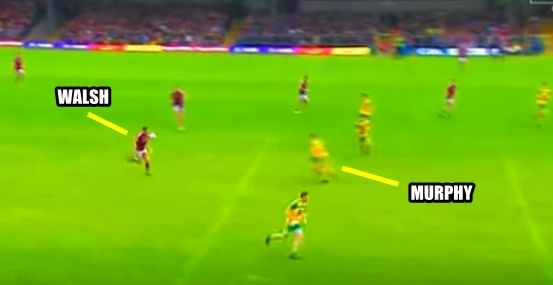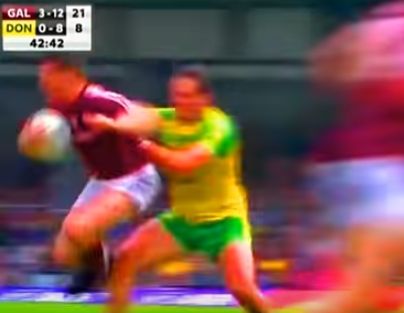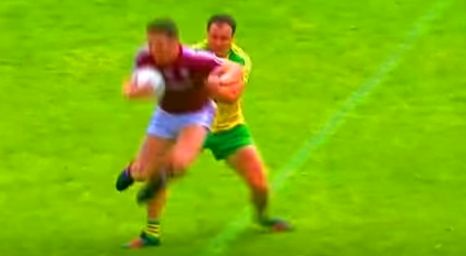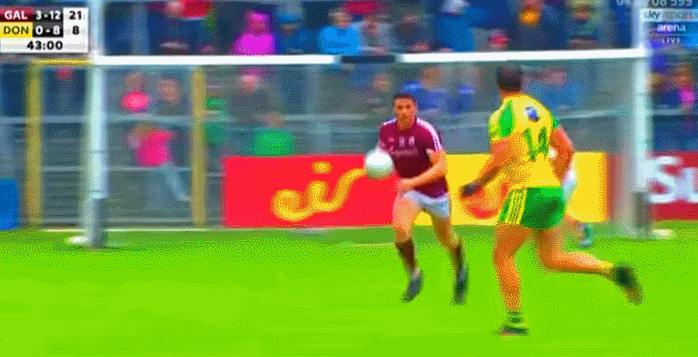Again and again and again and again.
It doesn't take much to help you lose faith in this rule but Michael Murphy's black card will definitely send you on your way.
You see a spike in site analytics - it probably happens in every media company - during a game when another contentious decision is made. Everyone is searching for information and clarity and they end up on an article from 2014.
What are the offences that warrant a black card? Everyone searches for that article because every time one of those cards are dished out, it seems to be for a different reason.
They're in their third season now but referees seem more confused than anyone.
Offences or fouls to be punished with a black card
- Deliberate body collide (what we know as a third man tackle)
- Deliberate trip
- Deliberate pull down
- Verbal abuse to an opponent or team mate
- Remonstrating with a match official
There's nothing there that even deals with cynically pulling a player back and stopping him going through on goal - a blatant, cynical foul or, you know, the reason the black card was brought in in the first place.
A player has never been black-carded for verbal abuse of an opponent either - perhaps that would've stopped everyone whinging about
Niall Morgan against Down.
A referee has never had the stones to send a player off for talking back to them - the GAA has therefore virtually done nothing to help weed out the on-field treatment of officials in that regard.
But those are just the accepted inconsistencies. The culture has embedded so badly that we're allowed to be completely ignorant of 40 per cent of the black card offences but matters aren't helped in any way when you have incidents like Michael Murphy's black card against Galway on Sunday.
Shane Walsh comes out of defence towards his own 65'.
Donegal aren't exactly straggling to get men behind the ball.
 Murphy hits Walsh with a forceful challenge.
Murphy hits Walsh with a forceful challenge.
Certainly a foul.
 Referee Anthony Nolan might argue that it was a trip.
Referee Anthony Nolan might argue that it was a trip.
 But, Jesus, for God's sake...
But, Jesus, for God's sake...

A lot of the problems with the black card are definitely how they're being applied by officials.
They're reaching for cards when there's absolutely no need for them, it's like they don't consider that a talking to is an option. In too many other cases, deliberate acts of cynicism are overlooked because referees seem afraid to make such a harsh judgement for what sometimes seem like inconsequential fouls.
The application of the rule is of course one of the biggest issues when two of the five offences (verbals and remonstrating) are permanently ignored and the rest are open to inconsistent interpretation.
But the rule itself needs to be rewritten because if referees actually applied them as they should, it would be even worse.
The black card's purpose is to stop cynical play, it's not there to prevent bad fouls from head on in the opposition half when there's no sign of even an attack yet.
Take out the verbal element to the rules because they're never applied anyway. Add in a cynical foul - whether it's pull down or pull back because cynicism is bloody cynicism. And please, just please adopt a common sense approach as to what is a professional foul or not. Ask whether this could be cynical play and whether it is or not - that should be the first question before looking at the technicality of the foul. That's what it's there for.
That would help for starters.



 Murphy hits Walsh with a forceful challenge.
Certainly a foul.
Murphy hits Walsh with a forceful challenge.
Certainly a foul.
 Referee Anthony Nolan might argue that it was a trip.
Referee Anthony Nolan might argue that it was a trip.
 But, Jesus, for God's sake...
But, Jesus, for God's sake...
 A lot of the problems with the black card are definitely how they're being applied by officials.
They're reaching for cards when there's absolutely no need for them, it's like they don't consider that a talking to is an option. In too many other cases, deliberate acts of cynicism are overlooked because referees seem afraid to make such a harsh judgement for what sometimes seem like inconsequential fouls.
The application of the rule is of course one of the biggest issues when two of the five offences (verbals and remonstrating) are permanently ignored and the rest are open to inconsistent interpretation.
But the rule itself needs to be rewritten because if referees actually applied them as they should, it would be even worse.
The black card's purpose is to stop cynical play, it's not there to prevent bad fouls from head on in the opposition half when there's no sign of even an attack yet.
Take out the verbal element to the rules because they're never applied anyway. Add in a cynical foul - whether it's pull down or pull back because cynicism is bloody cynicism. And please, just please adopt a common sense approach as to what is a professional foul or not. Ask whether this could be cynical play and whether it is or not - that should be the first question before looking at the technicality of the foul. That's what it's there for.
That would help for starters.
A lot of the problems with the black card are definitely how they're being applied by officials.
They're reaching for cards when there's absolutely no need for them, it's like they don't consider that a talking to is an option. In too many other cases, deliberate acts of cynicism are overlooked because referees seem afraid to make such a harsh judgement for what sometimes seem like inconsequential fouls.
The application of the rule is of course one of the biggest issues when two of the five offences (verbals and remonstrating) are permanently ignored and the rest are open to inconsistent interpretation.
But the rule itself needs to be rewritten because if referees actually applied them as they should, it would be even worse.
The black card's purpose is to stop cynical play, it's not there to prevent bad fouls from head on in the opposition half when there's no sign of even an attack yet.
Take out the verbal element to the rules because they're never applied anyway. Add in a cynical foul - whether it's pull down or pull back because cynicism is bloody cynicism. And please, just please adopt a common sense approach as to what is a professional foul or not. Ask whether this could be cynical play and whether it is or not - that should be the first question before looking at the technicality of the foul. That's what it's there for.
That would help for starters.